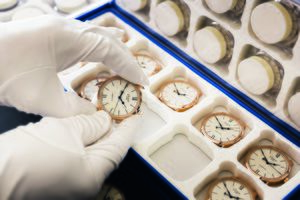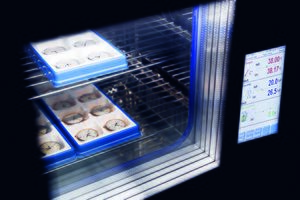Senator Excellence: 24 Days on the Test Bench
Manufactory Calibre 36 promises new standard of quality

The initial synchronization with a highly precise Glashütte chronometer.

A rotating test device is used to simulate the conditions under which the watch is worn on the wrist and to test it in different positions.

Each watch is put through 12-day test in six different positions.

Every Senator Excellence is tested for an entire day at three different temperatures: 8°, 23° and 38° Celsius.
Glashütte, June 2016
At the heart of the Senator Excellence the manufactory Calibre 36 introduces a new generation of timepieces, and with it the Glashütte Original manufactory defines an innovative new standard of quality. Every single one of these watches bears a special engraving on the case back, which must be understood as a promise. Together with an individual examination certificate, the engraving guarantees the owner that the watch meets the highest standards in terms of stability, running time, precision and aesthetics, and that it has been thoroughly examined over the course of a long-term test lasting 24 days – under conditions even more demanding than those in force for the standard German chronometer tests.
Day 1: Setting the watch and 24-hour position test
After manufacturing and assembly of a Glashütte Original Senator Excellence has been completed, it goes through several levels of testing. Following the initial synchronization with a highly precise Glashütte chronometer, each Senator Excellence is first put through a 24-hour position test. Here a rotating test device is used to simulate the conditions under which the watch is worn on the wrist and to test it in different positions; the rate deviation must remain within the range of only -4 to +6 seconds.
Days 2 – 13: Rate testing and adjustment in 6 positions
Each watch is then put through 12-day test in six different positions. The rate deviations are recorded carefully every day and serve as the basis for five important control values:
- The average daily rate – an average of all deviations, which must remain within the range of -4 to +6 seconds per day.
- The average of the absolute value of rate deviation registers the deviations within the positions; the sum total may not exceed 2 seconds per day.
- The absolute value of rate deviation ensures that the greatest absolute rate deviation in each of the six positions does not exceed 5 seconds.
- The rate difference in horizontal and vertical positions of the watch analyses its precision in these positions, with a tolerance of -6 to +8 seconds.
- The maximum rate spread determines the greatest deviation from the average daily rate, which may not exceed 10 seconds per day.
Days 14 - 16: Temperature dependency
Every Senator Excellence is tested for an entire day at three different temperatures: 8°, 23° and 38° Celsius, in order to determine its ability to withstand fluctuations in temperature. These values permit calculation of the so-called “temperature error” of a watch, which is expressed in kelvin measurement units: the closer the value is to zero, the more resistant the watch to temperature fluctuations. Glashütte Original defines a tolerance range of -0.6 to +0.6 seconds per kelvin.
Days 17 - 22: Rate stability and testing of the total running time of 100 hours
This data provides the basis for a close look at the rate stability (resumption of rate) of the watch during the tests performed to date. Its performance in the same position, “crown left/numeral 6 up” from Days 1 and 2 is compared to the rate deviation on Day 16; the relevant permissible tolerance lies in the range from -5 to +5 seconds per day. As a final step in the rate tests the total running time of at least 100 hours is put to the test. In this test the measurement values for rate deviation and amplitude at 0. 24, 48 and 72 hours are recorded using a timing machine. The rate deviation may not exceed -4 to +6 or +8 seconds (after 72 hours). In addition, sufficient amplitude must be assured each day (at least 270°, 250°, 230° and 200° respectively).
Day 23/24: Water resistance, visual and functional tests
With the assistance of high and low pressure testing, water resistance of up to 5 bar (50 meters) is assured. A number of randomly selected models are heated on a hotplate up to 40° to 45° Celsius; a drop of cool water is then placed on the front crystal. If there were to be any moisture in the watch, at this point condensation would form on the inside surface of the crystal. A comprehensive visual examination of the watch surfaces is performed, along with a test to ensure that the manual winding and crown functions are working properly.
Quality seal and examination certificate Only when all of these elaborate tests have been completed successfully do we award the seal of approval, in the form of a Q on the case back – a stylised representation of the promise of quality from Glashütte Original.
The inner circle of the letter stands for the high standards of German chronometer certification. The outer rings represent the different test criteria in which the Senator Excellence exceeds these requirements (test in six positions, performance in position-test device, the rate performance after 24/48/72 hours, total running time, water resistance, visual and functional examinations).
The results of the test are provided exclusively to the owner of a Senator Excellence. The most important data and results are recorded on an individual examination certificate, which is provided with every Senator Excellence upon purchase. In addition, the owner is assigned a personal access and QR code providing exclusive access to the Calibre 36 secure online portal, where all information regarding the performance of the owner’s watch is set out in detail.
>>> More pictures >>>
[[Category:Watch-Wiki news archive 2016]